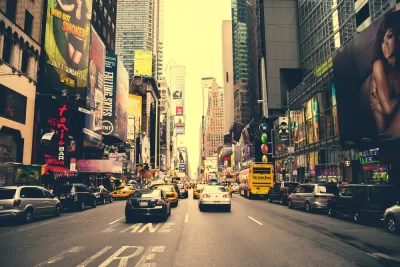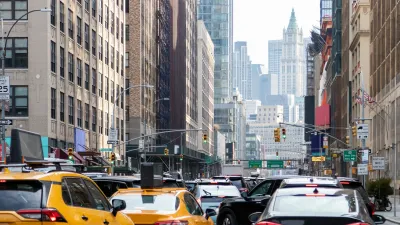The program took another step forward as the board approved a proposed pricing scheme, but lawsuits still stand in the way of full implementation.

The New York Metropolitan Transportation Authority Board voted to approve rates for the city’s congestion pricing program, setting the stage for the first such program in the country. “Revenues from the congestion pricing program are expected to allow the transit agency to secure about $15 billion in bonds to support its capital investment program.”
As Dan Zukowski explains in Smart Cities Dive, “Under the plan approved today, passenger vehicles and small commercial vehicles using an E-ZPass tag will be charged $15 from 5 a.m. to 9 p.m. weekdays and 9 a.m. to 9 p.m. on weekends. At night, the fee will drop to $3.75. Vehicles will only be charged once per day, and those without an E-ZPass tag will face tolls that are about 50% higher.”
Funding from the program is considered essential to making MTA subway stations more accessible and improving transit service in the city. “Revenues from the congestion pricing program are expected to allow the transit agency to secure about $15 billion in bonds to support its capital investment program.”
Zukowski points out that the MTA still needs to resolve multiple lawsuits before the program can go forward.
FULL STORY: New York transit leaders approve nation’s first congestion pricing program

Maui's Vacation Rental Debate Turns Ugly
Verbal attacks, misinformation campaigns and fistfights plague a high-stakes debate to convert thousands of vacation rentals into long-term housing.

Planetizen Federal Action Tracker
A weekly monitor of how Trump’s orders and actions are impacting planners and planning in America.

In Urban Planning, AI Prompting Could be the New Design Thinking
Creativity has long been key to great urban design. What if we see AI as our new creative partner?

Pedestrian Deaths Drop, Remain Twice as High as in 2009
Fatalities declined by 4 percent in 2024, but the U.S. is still nowhere close to ‘Vision Zero.’

King County Supportive Housing Program Offers Hope for Unhoused Residents
The county is taking a ‘Housing First’ approach that prioritizes getting people into housing, then offering wraparound supportive services.

Researchers Use AI to Get Clearer Picture of US Housing
Analysts are using artificial intelligence to supercharge their research by allowing them to comb through data faster. Though these AI tools can be error prone, they save time and housing researchers are optimistic about the future.
Urban Design for Planners 1: Software Tools
This six-course series explores essential urban design concepts using open source software and equips planners with the tools they need to participate fully in the urban design process.
Planning for Universal Design
Learn the tools for implementing Universal Design in planning regulations.
planning NEXT
Appalachian Highlands Housing Partners
Mpact (founded as Rail~Volution)
City of Camden Redevelopment Agency
City of Astoria
City of Portland
City of Laramie





























